This is, I guess, a sort of a sequel to my post last month, Early Era Hockey Heroes Played in Owen Sound. The names, this time, aren’t as prominent in hockey history as Howie Morenz and Cyclone Taylor, although these two contemporaries of Taylor are also members of the Hockey Hall of Fame. And, with Hockey Day in Canada hitting town next week, they’re relevant today because — like Taylor, who was born in Tara, Ontario — they were both born in small towns near Owen Sound. Remarkably, these two would later join Cyclone Taylor on the West Coast, giving the Vancouver Millionaires three Bruce County boys on their Stanley Cup team of 1915.
Russell Stanley, known as Barney Stanley for unknown reasons (and an uncle of latter-day NHL star Allan Stanley), was born in Paisley, Ontario, on June 1, 1893. Duncan McMillan “Mickey” MacKay made his debut almost a year later, on May 25, 1894. Both would begin to make their names in hockey during the winter of 1910-11, playing for their respective hometown teams in District 2 of the Northern Hockey League (NHL) along with clubs in Durham, Hanover, Walkerton and here in Owen Sound. MacKay’s Chesley team also competed in the Ontario Hockey Association’s junior series that winter.
Paisley’s 1910-11 NHL team was a weak one, finishing the 10-game season with a record of just 2-8. Stanley was obviously a standout, though, and after Owen Sound crushed his team 11-2 in the season opener on local ice here, the Owen Sound Times of January 12, 1911, reported: “Had there been two or three more in the Paisley bunch of the calibre of Barney Stanley, there would have been a different tale to tell in the final tally…. With a teammate as fast as he himself is, Barney would be a dangerous shooting proposition for any ordinary team to go up against.”
MacKay (whose name was often spelled, incorrectly, as McKay) helped Chesley win the District 2 title that winter, though they would lose the league championship to the District 1 winners from Mt. Forest. But, other than having his name appear (as McKay) in the lineup in a summary in the Owen Sound Sun on March 3, 1911 after a game the night before, there appear to be no other mentions of him in the local paper. However, his hometown weekly, The Chesley Enterprise, noted him prominently throughout the season … despite also spelling his name wrong.
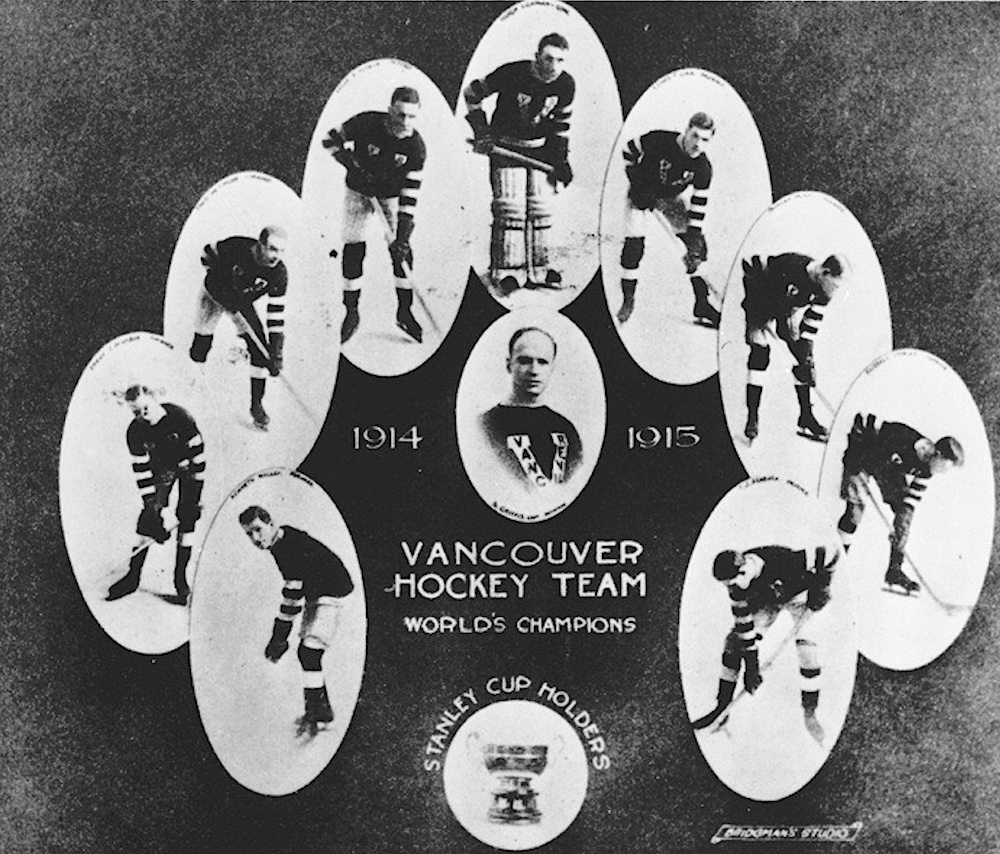
is Patterson Cup – the championship trophy of the Pacific Coast Hockey Association.
“McKay [was] always in the right place,” noted the Enterprise on March 2, 1911, reporting on the team’s final home game (played two nights earlier). He scored at least 8 goals in a 25-0 win over Walkerton. When Chesley clinched the District 2 title with a 7-3 win over Durham in Walkerton on March 7, the local paper, reporting two days later, said: “Every man on the Chesley team played the game of his life; Beatty, Rocker and McKay apparently being the favorites of the crowd…. McKay, as in Owen Sound, was conceded to be a marvel.”
Mickey MacKay was still in Chesley for the winter of 1911-12, playing again for the local team in the NHL and moving up to the intermediate division in the OHA. Barney Stanley had moved out west that year to Edmonton. Hockey would take him to many more places after that, but Edmonton would remain home for the rest of his life.
Stanley began the winter of 1911-12 in Edmonton playing hockey for the Eurekas, a team affiliated with the Westminster Church, in a local Sunday School league. He quickly attracted the attention of an Edmonton team called the Maritimers, who played senior hockey with the Eskimos, Edmonton YMCA and the University of Alberta in a northern provincial league, and finished the year with them.
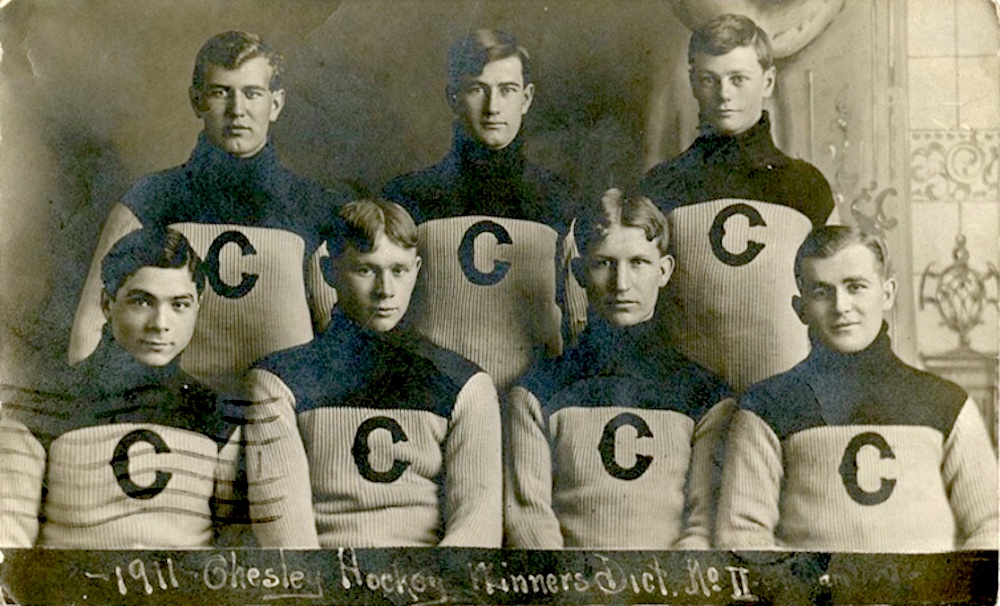
Mickey MacKay is the very young looking kid standing at the top right.
According to a story from the Edmonton Journal, picked up in the Ottawa Citizen on April 5, 1918, it was in the fall of 1912 that one Bruce County boy helped another begin his journey to the west.
“It was in the autumn of 1912 that Barney Stanley, himself just graduated from a local junior league, approached Deacon White and Anse Young, telling of a boy down in Chesley, Ontario, who had been burning up the Junior OHA and was anxious to come west.” The only thing holding him up was the cost of the journey, “and the Deacon, always ready to gamble a few dollars in the cause of sport, produced the wherewithal…. It did not take the fans long to reach the conclusion that MacKay was one player from the east who would live up to advance notices, and before the winter was over he was a universal favorite.”
The Chesley Enterprise of October 17, 1912, notes only that “Duncan McKay has gone to Edmonton… ” with no mention of Barney Stanley’s role, but Stanley and MacKay would play together that season of 1912-13 on a new team in Edmonton called the Dominions. Stanley would remain with that team for a couple seasons more, but MacKay moved further west the next winter, to Grand Forks, a mining town in the West Kootenay region of British Columbia. According to stats from the Society for International Hockey Research, MacKay led the Boundary Hockey League with 15 goals during the 10-game 1913-14 season before moving further west, to Vancouver, the following year.

Walkerton, Hanover and Durham, indicated with arrows, also played in the “NHL.”
Grand Forks would remain home to Mickey MacKay for the rest of his life, but it seems he returned to Chesley following that first B.C. winter. As Frank Patrick — owner, coach, manager, and a star player, with the Vancouver Millionaires — would recall in newspaper stories in 1940 and again in 1950, he received a letter from MacKay from Chesley in the summer of 1914.
According to the 1940 story, Patrick, who frequently received letters from players who thought they were good enough to turn pro, wrote back to MacKay and recommended he try to catch on with a Toronto team. “I don’t know what made me change my mind,” said Patrick, “but I sent a following letter with transportation and told him to report to Vancouver. It was one of those sixth sense hunches. MacKay wasn’t practicing five minutes before he attracted the attention of all watching him…. He was perhaps the greatest centre we ever had on the coast; an equal favorite with Cyclone Taylor in the minds of the masses.”
Frank Patrick provided more details to the story in 1950, telling Alf Cottrell of the Vancouver Province, that he’d never forgotten MacKay’s letter and could almost quote it from memory.

References to Stanley and McKay/McKay are in the red rectangles.
“The writer,” recorded Cottrell, “said he had played for an amateur club out in Grand Forks, B.C. the previous winter. No doubt Mr. Patrick had heard of him, as he had done very well. And he would like to play for Patrick’s Vancouver club for special reasons. There was, the young follow said, a young lady out in B.C. whom he would like to marry. Would Mr. Patrick forward money for transportation, so he could come out when the season started and lay his wares on the ice, so to speak?”
Patrick again told the story about recommending this young player try out for a Toronto team, but this time he said he decided he liked the sound of the name Mickey MacKay. So, he changed his mind and sent a second letter enclosing transportation.
Is either version of the story true?
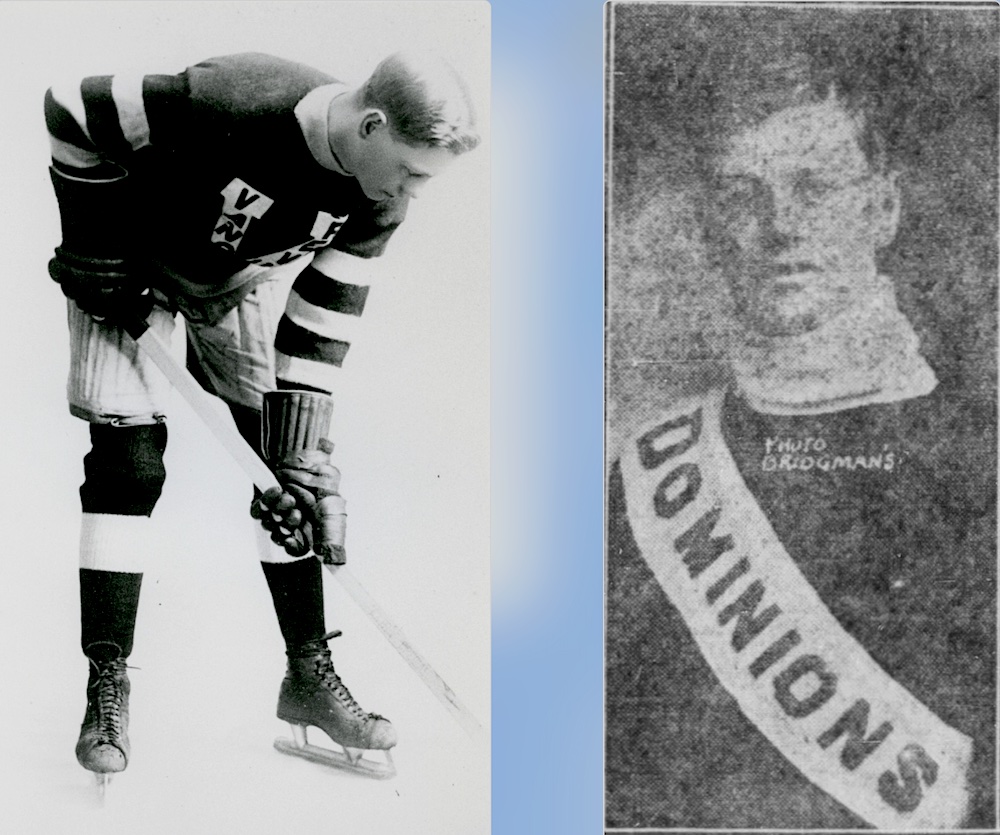
grainy newspaper photo with the Dominions in Edmonton
Well, Mickey MacKay did marry Miss Anne May Reburn of Grand Forks on June 13, 1916. But in his own version of how he wound up in Vancouver, it was Frank Patrick who sought him out. MacKay told his tale in the Owen Sound Sun-Times on January 23, 1932, while visiting his mother and a sister in Chesley.
“It is interesting to hear Mickey tell about his jump into the pro game,” wrote the Sun-Times correspondent. “He was playing amateur with Grand Forks and in the mining towns of British Columbia the going was tough. Frank Patrick heard how he was burning up the league so he telegraphed him transportation and instructions to report at Vancouver.”
The Chesley Enterprise of November 19, 1914, reports on MacKay (still spelled McKay) leaving for Vancouver “on Tuesday last week,” seemingly from Chesley, though with references to his success in Grand Forks. “Still in his teens,” says the 1932 Owen Sound story – though he would actually have been 20 at the time – “Mickey kept thinking things over on his trip to the coast and the more he thought of it, the less he figured he could make good, so when he arrived at Vancouver and was met by Patrick, the first question he asked was, ‘Say, if I don’t catch on with your team, do I get my transportation back home?’”
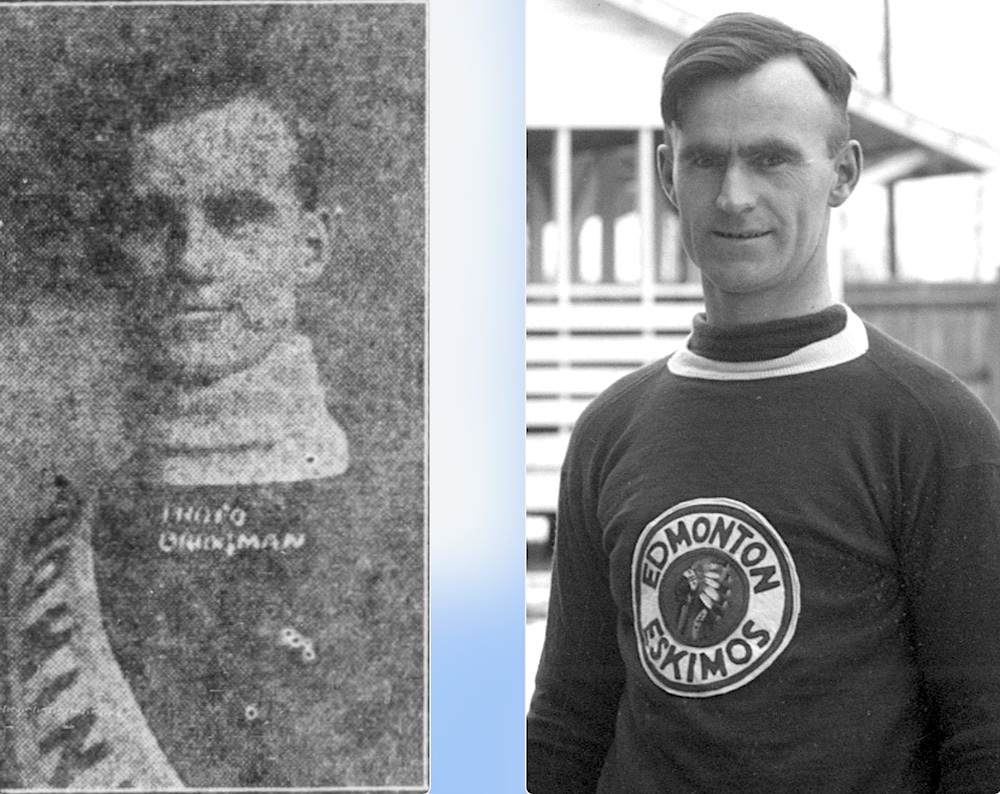
Patrick wanted a look at him first, and brought MacKay down to the rink. Mickey told of “being taken to the dressing room and introduced to such seasoned performers as Cyclone Taylor, Si Griffis, Frank Nighbor … and Hughie Leman [all future Hall of Famers]. The boys were dressing for a work out and as he was introduced to each one in turn, they merely stuck out a hand, pulled it hastily away, but never said a word or looked up from the lacing of their boots.
“‘A swell reception,’ Mickey thought!”
When he got out on the ice and saw Taylor in action, MacKay figured he’d be sent back to Grand Forks for sure. But then, he decided to take a run at the game’s biggest star. “Before I knew it, I was headed full speed for Taylor. I checked him and sent him sprawling into the boards and sailed clean through the whole outfit and never stopped…”
MacKay made the team. And carried with him the good wishes of his old friend Barney Stanley, who predicted great things for him that winter. “Mark my words,” Stanley was quoted in the Edmonton Journal of December 8, 1914, “Mickey will be a sensation this winter.”
And he was.
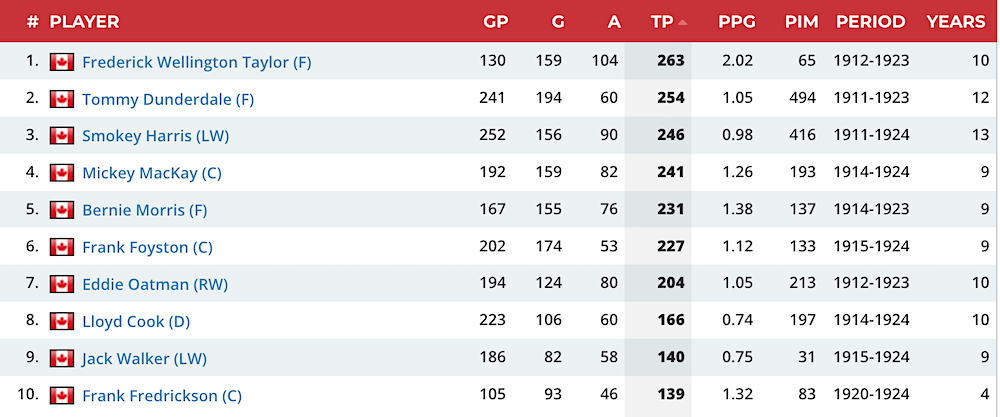
Barney Stanley ranked 18th with 62 goals and 37 assists in 80 games played.
MacKay scored three times in his pro debut for Vancouver against Portland that same night, leading the Millionaires to a 6-3 victory. “Our own speedy hockey player was the sensation of the first game,” The Chesley Enterprise reported with pride on December 17, 1914. He would go on to lead the Pacific Coast Hockey Association with 33 goals in just 17 games played in 1914-15, and his 44 points were just one back of Cyclone Taylor who led all scorers with 45 points on 24 goals and a league-leading 21 assists.
Late that season, Barney Stanley joined Mickey MacKay in Vancouver, signing with the Millionaires on February 13, 1915. In his debut three nights later, Stanley scored the opening goal on a setup from Taylor. MacKay collected a goal and an assist in a 5-0 victory over Portland. Stanley would score seven goals in the five games he played with Vancouver through the end of the schedule.
After the season, in a best-of-five Stanley Cup series with the Ottawa Senators of the National Hockey Association (forerunner of the NHL), Stanley added six more goals in three games. MacKay had four goals and two assist, while Cyclone Taylor had seven goals and two assists as Vancouver scored a stunning sweep by scores of 6-2, 8-3 and 12-3.
The two new Bruce County boys, along with the old one, had definitely made their mark.
* * * * * * * * * * * *Hockey Writers in Canada
In conjunction with Hockey Day in Canada, the Owen Sound library will be hosting a series of author events from January 17 to 21 they’re calling Hockey Writing in Canada. For information on the whole program, and all the writers involved, you can contact the library at info@library.osngupl.ca. If you’d like a direct link to the zoom event featuring me and Owen Sound-born author and historian Paul White at 3pm on the afternoon of Friday, January 20, email me at eric@ericzweig.com and ask me for it.
Exquisite stuff, as usual with Pal Eric at the keyboard. Apart from the terrific tales of yesteryear, I was jolted upon seeing the name of Barney Stanley. The year I worked for the Rangers as asst. publicist in 54-55, one of our top defensemen was Barney’s nephew Allan Stanley. At some point in putting together the Rangers guide, it was noted that Allan’s uncle Barney also was a superior player. While I was pals with Allan, I never thought to ask him if he learned any tips from his uncle. Too bad. Unfortunately, that same season, Allan — booed by foolish NY fans — was traded to Chicago in late November and later Toronto. He won 4 Cups and is in the Hall of Fame.
There is a book about top hockey writers in Canada. You should sue as your name isn’t there. An excellent story of when hockey was the sport of fans not millionaire Yanks out to make a buck or two( thousand) and players who earn more in a season than medical people do in a lifetime.
Sport was just what that word means…a fun activity. Today, with the growth of all the online betting, the game itself is unimportant, what matters is the over/under and such trivia.
A co-worker years ago, a former football player, explained that which team won wasn’t important in the Pro leagues. It was a side issues that you could gamble on. So Marner’s streak and did the Leafs win was not the issue. Did he score the first goal? If the Leafs lost 10-1 did he figure in the only Leaf goal? Did he out point Matthews?
There even was an item about which area served the best hot dogs!
So never mind Lord Stanley’s mug. Molson’s or Labatts? Who wins the burping contest.
Great story, as always.
Hey Ray: what is that book about hockey writers called. I’d like to follow up.
Ray says: “Best Canadian Sports Writing” edited by Stacey May Fowles and Pasha Mallah. The spine says ECW, who got a grant from our taxes vis. gov’t
A few Mickey MacKay related notes:
1) His scoring exploits with Grand Forks in 1913-14 (15 goals in 10 games) were all the more amazing when you consider that the rest of his team combined only scored 20 goals. In the rest of the league that year, Phoenix scored 26 goals and Greenwood 20. So MacKay single-handedly accounted for over 18 per cent of league scoring.
2) MacKay and Cyclone Taylor reunited in Rossland, BC in August 1937 when Taylor was visiting as part of his duties as chief commissioner of the immigration department. MacKay was killed in a car accident less than three years later.
3) In the fall of 1939, MacKay was selling insurance in Salmo, near Nelson. He was supposed to move into a duplex being remodeled, but it burned down shortly before he was supposed to take possession. It was not reported whether it was insured.
4) Some time between 2018 and 2021, the City of Grand Forks designated the road that runs behind its hockey rink Mickey MacKay Lane. There’s a sign to that effect, but it may not have been officially gazetted, as it doesn’t seem to show up on any map.
Keep it coming Eric. Love the home county content…(well Bruce is close to Grey so it qualifies).